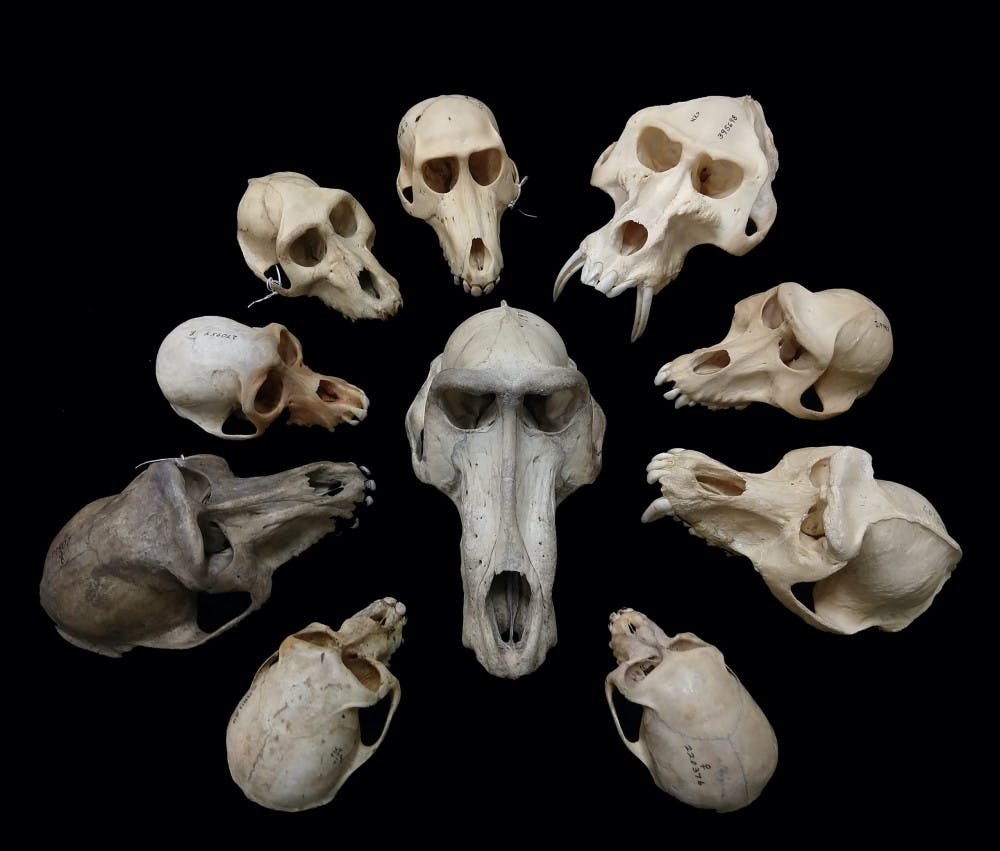Assistant Professor Dr. Tesla Monson received $23,265 from the Leakey Foundation to help with her investigation on cranial variation in colobine primates

By Alison Ward
A Western Washington University anthropology assistant professor received a grant of $23,265 from the Leakey Foundation to help with investigative research and 3D imaging experience for students.
Tesla Monson, who has a Ph.D. in integrative biology, runs the primates evolution lab at Western. Monson plans to investigate the cranial variation — skull or cranium differences — of colobine primates by visiting the American Museum of Natural History in New York City and the National Museum of Natural History in Washington D.C.
"I think that an important part of my research is using my voice to talk about the role of anthropology as a science and as a lens through which we can look at our society," Monson said. "Every day we hear about human variation, although we might not always recognize it — variation in response to disease, variation in access to health care, variation in opportunities for education and treatment by the justice system — this is all biological anthropology."
Monson’s research will help people better understand how the primate cranium evolved. The research will deepen society’s understanding of humanity's ancestors through the fossil record.
Colobinaes are one of the two subfamilies, along with Cercopithecines make up the old world monkeys. According to The Nature Education, a widely recognized leader in the scientific community with award-winning quality sources, these primates are diverse in body size, habitat and social organization.
Monson's work will feature her findings from the museums in New York City and Washington D.C and will allow students in her lab to partake in this research sometime in fall 2022.
Monson said she will digitally scan Colobine skulls held in the museum collections using a handheld 3D scanner. Students in the lab will collect 3D data from the scans to measure differences in the crania, which will allow them to run statistical analyses to investigate differences in the form or shape of the skulls.

Monson has written 16 published peer-reviewed papers covering a wide range of topics from the teeth of primates and artiodactyls — hooved mammals — to cranial variation in baboons and their relatives.
"This [research] actually builds from previous research where I showed that patterns of cranial variation differ between Colobines and their close relatives, the Cercopithecines, which include baboons and macaques," Monson said. "These differences are important for several reasons."
The $23,265 grant from the Leakey Foundation will go to the university through the Office of Research and Sponsored Programs. According to the Office of Research and Sponsored Programs, they use federal regulations to make and implement policies that assist researchers and ensure research is conducted ethically.
"I feel like this [funding and research] is great exposure for our department,” said Catherine Kiser, a fourth-year anthropology major. “Not only will this kind of research draw more students to Western’s anthropology department, but it may also open doors for additional funding in the future.”
The Leakey Foundation based in San Francisco, California, has awarded more than $1 million annually in field and laboratory grants for vital new research and long-term projects, according to their website.
Sharal Camisa, The Leakey Foundation’s executive director, said The Leakey Foundation is a nonprofit organization, focused on funding research that uncovers the human story and gives grants to scientists, while also providing opportunities to share their research.
To receive the funding, Monson said she wrote a grant proposal describing the project, including details about the monkeys she will look at and a complete budget for all aspects of the work.
Students can view Monson's past research, classes and information about working with Monson in her lab.
"My thoughts on Professor Monson receiving the grant is ‘congratulations’," said Emily Hill, a Western alumna with a degree in anthropology. "I also think this could be a really good opportunity for the Western anthropology and archaeology department to possibly further develop a program where students can study primate evolution."
Alison Ward is the opinions editor for The Front and a second-year public relations journalism major and sociology minor. Alison focuses on providing local news while calling attention to important stories, opinions, and concerns from the community. You can contact her at alisonward.westernfront@gmail.com or westernfront.opeditor@gmail.com.





